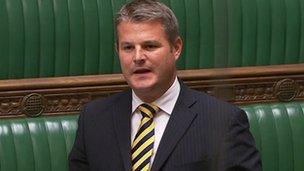MP bids to allow prisoners' mobile phones to be sold off
- Published

Mr Andrew said 41,000 confiscated mobile phones were currently being held in storage
Britain's prisons are storing 41,000 mobile phones seized from inmates at a cost of £20,000 a year, MPs have been told.
Tory MP Stuart Andrew has called for the phones, often taken in cell raids, to be destroyed or sold to raise money for victims charities.
The phones can currently be returned to a prisoner once they have finished their sentence.
Mr Andrew wants a new law to stop this "perverse and outrageous" situation.
Mobile phones are banned in prison but are often smuggled in to inmates. There have been cases of prisoners using them to contact victims' families, update their social media pages and even arrange a gangland murder.
Ministers said the selling the seized phones off for charity could save money in storage costs and make a "significant contribution" to preventing banned items in prison.
Shadow justice secretary Sadiq Khan said Labour was backing Mr Andrew's Prisons (Property) Bill - which was having its second reading.
If passed, the bill would create a new power for governors to "destroy or otherwise dispose of any unauthorised property found within a prison or within an escort vehicle".
'Menace'
However, it is likely to need the full backing of the government if it is to become law.
During a debate in the Commons, Mr Andrew said: "Currently there is nothing in law giving any powers to governors to destroy property that prisoners should not have.
"As a result, astonishingly, any items seized have to be stored by governors and kept in safe-keeping for the duration of the prisoner's term.
"These are all waiting to be claimed by people who frankly shouldn't have had them in the first place.
"What the bill will hopefully, finally, allow is for prison governors to sell the property so they can then donate that money to charities like Victim Support, so the proceeds of those criminal activities go back to the victims who have suffered at the hands of these prisoners."
Tory MP and crown court judge Robert Buckland said mobiles in prisons were "a menace".
"The communal wing mobile phone is a phenomenon that I'm afraid has been with us for far too long.
"Whilst this bill cannot - and nobody's pretending that it can - deal with the problem of getting phones and items into prison, what I believe it does do, is give another resource to the prison authorities to deal effectively with these items of contraband when they are found," Mr Buckland said.
'Nefarious purposes'
Sadiq Khan said he welcomed the clarity the bill would provide.
"We will be encouraging governors, as has been suggested by the member for Pudsey (Stuart Andrew), to use the proceeds for example for Victim Support or for families of victims," he said.
Prisons minister Jeremy Wright confirmed that tens of thousands of mobile phones were being stored at taxpayers expense, with very few ever being claimed back.
"In 2011 only 112 mobile phones were claimed back out of the total of 41,000 currently being stored.
"Only 49% of them are attributable to specific prisoners, so could not be returned to a released prisoner.
"The cost of storing them is in the region of £20,000 a year and there are something in the order of 800 phones seized every month."
"This is property that should not be in prison in the first place, that is being used while it is in prison for a variety of nefarious purposes.
"Anything we can do to prevent that, we should do. This bill makes a significant contribution to that task."
The bill was passed onto the next Parliamentary stage unopposed and will now be debated by a committee of MPs.
- Published14 September 2012
- Published25 June 2012